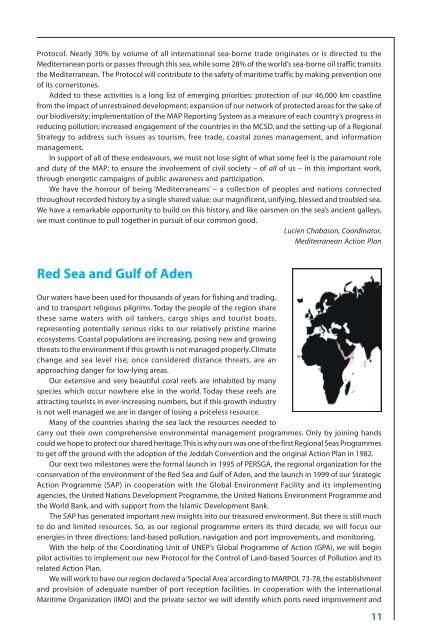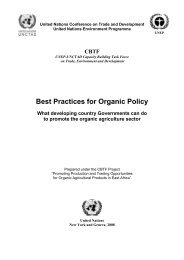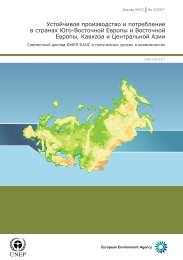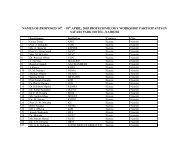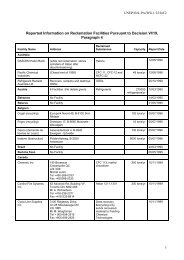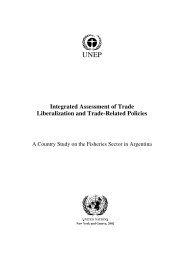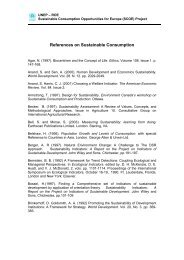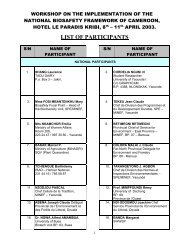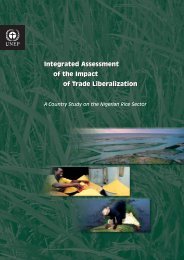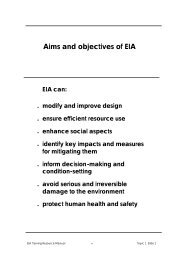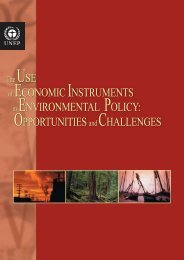Regional Seas: Strategies for sustainable development - UNEP
Regional Seas: Strategies for sustainable development - UNEP
Regional Seas: Strategies for sustainable development - UNEP
Create successful ePaper yourself
Turn your PDF publications into a flip-book with our unique Google optimized e-Paper software.
Protocol. Nearly 30% by volume of all international sea-borne trade originates or is directed to the<br />
Mediterranean ports or passes through this sea, while some 28% of the world’s sea-borne oil traffic transits<br />
the Mediterranean. The Protocol will contribute to the safety of maritime traffic by making prevention one<br />
of its cornerstones.<br />
Added to these activities is a long list of emerging priorities: protection of our 46,000 km coastline<br />
from the impact of unrestrained <strong>development</strong>; expansion of our network of protected areas <strong>for</strong> the sake of<br />
our biodiversity; implementation of the MAP Reporting System as a measure of each country’s progress in<br />
reducing pollution; increased engagement of the countries in the MCSD, and the setting-up of a <strong>Regional</strong><br />
Strategy to address such issues as tourism, free trade, coastal zones management, and in<strong>for</strong>mation<br />
management.<br />
In support of all of these endeavours, we must not lose sight of what some feel is the paramount role<br />
and duty of the MAP: to ensure the involvement of civil society – of all of us – in this important work,<br />
through energetic campaigns of public awareness and participation.<br />
We have the honour of being ‘Mediterraneans’ – a collection of peoples and nations connected<br />
throughout recorded history by a single shared value: our magnificent, unifying, blessed and troubled sea.<br />
We have a remarkable opportunity to build on this history, and like oarsmen on the sea’s ancient galleys,<br />
we must continue to pull together in pursuit of our common good.<br />
Lucien Chabason, Coordinator,<br />
Mediterranean Action Plan<br />
Red Sea and Gulf of Aden<br />
Our waters have been used <strong>for</strong> thousands of years <strong>for</strong> fishing and trading,<br />
and to transport religious pilgrims. Today the people of the region share<br />
these same waters with oil tankers, cargo ships and tourist boats,<br />
representing potentially serious risks to our relatively pristine marine<br />
ecosystems. Coastal populations are increasing, posing new and growing<br />
threats to the environment if this growth is not managed properly. Climate<br />
change and sea level rise, once considered distance threats, are an<br />
approaching danger <strong>for</strong> low-lying areas.<br />
Our extensive and very beautiful coral reefs are inhabited by many<br />
species which occur nowhere else in the world. Today these reefs are<br />
attracting tourists in ever-increasing numbers, but if this growth industry<br />
is not well managed we are in danger of losing a priceless resource.<br />
Many of the countries sharing the sea lack the resources needed to<br />
carry out their own comprehensive environmental management programmes. Only by joining hands<br />
could we hope to protect our shared heritage. This is why ours was one of the first <strong>Regional</strong> <strong>Seas</strong> Programmes<br />
to get off the ground with the adoption of the Jeddah Convention and the original Action Plan in 1982.<br />
Our next two milestones were the <strong>for</strong>mal launch in 1995 of PERSGA, the regional organization <strong>for</strong> the<br />
conservation of the environment of the Red Sea and Gulf of Aden, and the launch in 1999 of our Strategic<br />
Action Programme (SAP) in cooperation with the Global Environment Facility and its implementing<br />
agencies, the United Nations Development Programme, the United Nations Environment Programme and<br />
the World Bank, and with support from the Islamic Development Bank.<br />
The SAP has generated important new insights into our treasured environment. But there is still much<br />
to do and limited resources. So, as our regional programme enters its third decade, we will focus our<br />
energies in three directions: land-based pollution, navigation and port improvements, and monitoring.<br />
With the help of the Coordinating Unit of <strong>UNEP</strong>’s Global Programme of Action (GPA), we will begin<br />
pilot activities to implement our new Protocol <strong>for</strong> the Control of Land-based Sources of Pollution and its<br />
related Action Plan.<br />
We will work to have our region declared a ‘Special Area’ according to MARPOL 73-78, the establishment<br />
and provision of adequate number of port reception facilities. In cooperation with the International<br />
Maritime Organization (IMO) and the private sector we will identify which ports need improvement and<br />
11


